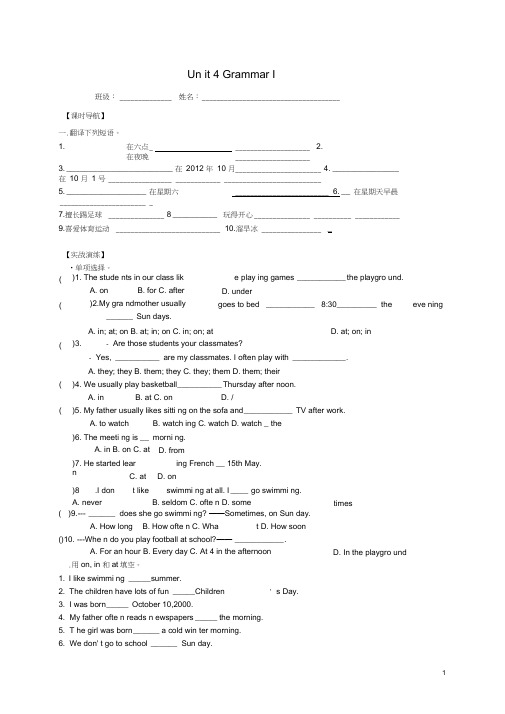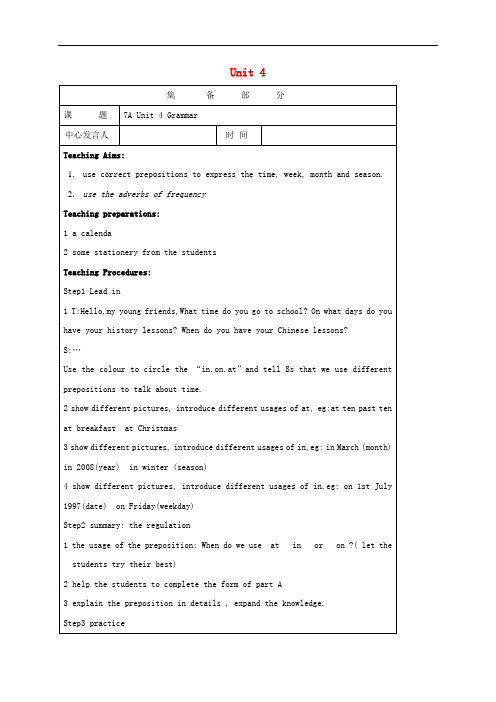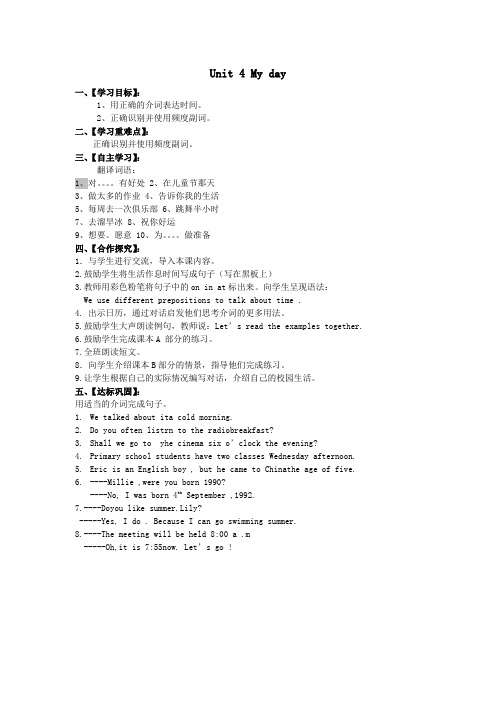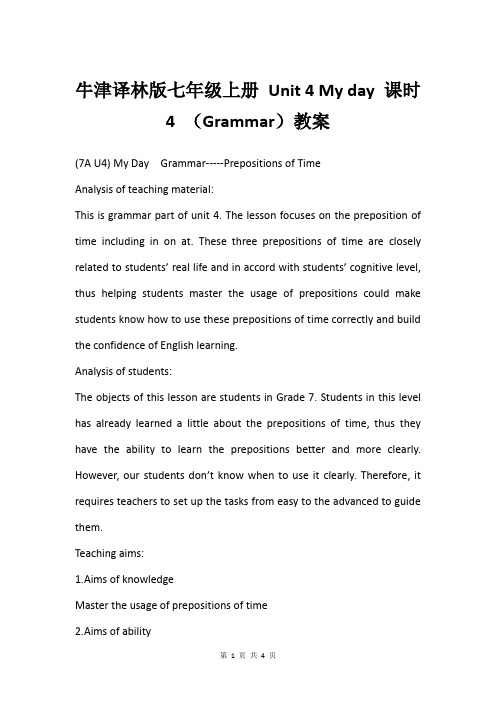七年级英语上册 Unit 4My dayGrammar导学案新牛津版
- 格式:doc
- 大小:108.00 KB
- 文档页数:2

Un it 4 Grammar I班级: ______________ 姓名: _____________________________________【课时导航】一.翻译下列短语。
1. 在六点 _ ____________________2.在夜晚 ____________________3. ________________________ 在 2012 年 10 月_______________________4. _______________ 在 10 月 1 号 _________________ ____________ __________________________5. __________________ 在星期六 _________________________6. __ 在星期天早晨 _______________________ _7.擅长踢足球 _______________ 8 __________ 玩得开心 _______________ __________ ____________ 9.喜爱体育运动 ____________________________ 10.溜旱冰 ________________ _【实战演练】•单项选择。
( )9.--- ______ does she go swimmi ng? ——Sometimes, on Sun day.A. How longB. How ofte nC. Wha tD. How soon()10. ---Whe n do you play football at school?—— ___________ .A. For an hourB. Every dayC. At 4 in the afternoon .用on, in 和at 填空。
1. I like swimmi ng _____ s ummer.2. The children have lots of fun _____ C hildren ' s Day.3. I was born _____ October 10,2000.4. My father ofte n reads n ewspapers _____ the morning.5. T he girl was born ______ a cold win ter morning.6. We don' t go to school ______ Sun day.( ( ( ( )1. The stude nts in our class lik A. on B. for C. after )2.My gra ndmother usually ______ Sun days.e play ing games ___________ the playgro und.D. undergoes to bed ___________ 8:30 _________ theA. in; at; onB. at; in; onC. in; on; atD. at; on; in)3. - Are those students your classmates?- Yes, __________ are my classmates. I often play with ____________ .A. they; theyB. them; theyC. they; themD. them; their)4. We usually play basketball __________ Thursday after noon.A. inB. atC. onD. /( )5. My father usually likes sitti ng on the sofa and ___________ TV after work.A. to watch )6. The meeti ng is __ A. inB. onC. at B. watch ing C. watchD. watch _ themorni ng.D. fromeve ning )7. He started lear n A. to B. for C. at ing French __ 15th May.D. on)8 .I don A. never t like swimmi ng at all. I ____ go swimmi ng.B. seldomC. ofte nD. some timesD. In the playgro und7. My birthday is _______ A pril 1st.8. We' re going to see the doctor _______ f our o ' clock.9. He ofte n takes Eddie for a walk ____ the evening.10. They have a long holiday ____ November.11. He was born _____ 1992.12. He likes readi ng n ewspapers ____ breakfast.13. She starts learning English ___ 6 o ' clock.14.lt ' s cold ________ winter in China.15. They play the game ________ the evening of 31st October.【拓展延伸】一•根据所给首字母或汉语写出句中所缺单词。


Unit 4 My day一、【学习目标】:1、用正确的介词表达时间。
2、正确识别并使用频度副词。
二、【学习重难点】:正确识别并使用频度副词。
三、【自主学习】:翻译词语:1、对。
有好处2、在儿童节那天3、做太多的作业4、告诉你我的生活5、每周去一次俱乐部6、跳舞半小时7、去溜旱冰 8、祝你好运9、想要。
愿意 10、为。
做准备四、【合作探究】:1.与学生进行交流,导入本课内容。
2.鼓励学生将生活作息时间写成句子(写在黑板上)3.教师用彩色粉笔将句子中的on in at标出来。
向学生呈现语法:We use different prepositions to talk about time .4. 出示日历,通过对话启发他们思考介词的更多用法。
5.鼓励学生大声朗读例句,教师说:Let’s read the examples together.6.鼓励学生完成课本A 部分的练习。
7.全班朗读短文。
8.向学生介绍课本B部分的情景,指导他们完成练习。
9.让学生根据自己的实际情况编写对话,介绍自己的校园生活。
五、【达标巩固】:用适当的介词完成句子。
1.We talked about ita cold morning.2.Do you often listrn to the radiobreakfast?3.Shall we go to yhe cinema six o’clock the evening?4.Primary school students have two classes Wednesday afternoon.5.Eric is an English boy , but he came to Chinathe age of five.6.----Millie ,were you born 1990?----No, I was born 4th September ,1992.7.----Doyou like summer.Lily?-----Yes, I do . Because I can go swimming summer.8.----The meeting will be held 8:00 a .m-----Oh,it is 7:55now. Let’s go !。

牛津译林版七年级上册Unit 4 My day 课时4 (Grammar)教案(7A U4) My Day Grammar-----Prepositions of TimeAnalysis of teaching material:This is grammar part of unit 4. The lesson focuses on the preposition of time including in on at. These three prepositions of time are closely related to students’ real life and in accord with students’ cognitive level, thus helping students master the usage of prepositions could make students know how to use these prepositions of time correctly and build the confidence of English learning.Analysis of students:The objects of this lesson are students in Grade 7. Students in this level has already learned a little about the prepositions of time, thus they have the ability to learn the prepositions better and more clearly. However, our students don’t know when to use it clearly. Therefore, it requires teachers to set up the tasks from easy to the advanced to guide them.Teaching aims:1.Aims of knowledgeMaster the usage of prepositions of time2.Aims of abilityBe able to use prepositions to talk about their daily life with classmates. Be able to know the differences among these three prepositonsBe able to write an article with prepositions of time correctly.3.Aims of emotionRaise the awareness of interculture.Build confidence towards English grammar.Be active and cooperative in team work4.Aims of strategyMaster some methods of team learning.Conclude the rules from exercises by themselvesTeaching key points:Master the usage of prepositons of time including in on atTeaching difficult points:Some special usage of three prepositions such as we use on when the morning、afternoon、evening with specific adjective; we don’t use preposition if there is next, last and so on before timeTeaching method:1.Task-based teaching method2.Natural approachmunicative language teaching methodputer-assisted instructionTeaching aids:1.Text book2.Power point3.Listening recordingTeaching Procedures:Steps Time Teacher’s activity Students’ activity PurposeStep 1 Lead-in 3 mins show a short video talk about Halloween Enjoy a short video Talk about Halloween To learn something about interculture To be prepared for the classStep2 presentation 10 mins Activity1:(4mins) 1.Text reading and pay attention to the prepositions of time Read the text and then answer questions with in on at To develop general sense of prepositions Activity 2:(6mins) give some examples and make students work out the rules about in on at by team work Talk about rules with classmates To develop general sense of prepositions To develop their team spirits Step3 Practice 20 mins Activity3:(3min) Show some exercise Fill in the blanks with preposition To help Ss consolidate the knowledge of prepositonsActivity4:(6mins) complete the e-mails by listening Listen to the tape and complete the e-mail To improve student’s ability of listeningActivity5: (3mins) fill in the blanks Talk with classmates about the differences in prepositons used before festivals To help students know the differences between on &at used before festivalsActivity6:(3mins) brainstorm Think about more festivals with day, the more the better To encourage students to take part in class and remember the rulesActivity7:(3mins) .make a choice Choose the best answer To help students know that we use on beforeActivity8:(2mins) translation Translate the sentences To help students know that we don’t when we don’t use prepositonsStep4 summary&Homework 7 mins Activity 9: describe the pictures Activity 10: make an interview Assign homework:1.Revise the rules of prepositions of time. 2. Describe your daily life with “in”, “on” and “at.”1.describe the pictures with prepositions2. use the prepositions to make an interview3.reviese the prepositions afterschool To guide Ss use the prepositions correctly and relate the grammar to their lifeTeaching reflection。

Unit 4 My dayGrammarTeaching aims1. To use prepositions to talk about time correctly;2. To use the adverbs of frequency correctly;3. To grasp the usage of“how often”;4. To use these items of grammar to talk about their daily life.Teaching contents1. New words and phrases:would, would like, life, all the best, roller skating2. New structure:How often do they exercise?Important and difficult points1. Know better about some usages of the prepositions of time.2. Tell the difference between ‘how often’ and “how many times”.Teaching proceduresA Prepositions of timeStep 1 Presentation1. Find out the phrases which should be put after ‘in/ on/ at’ one by oneT: Hello, boys and girls. This is our school. We know a lot about it. Today, there will be a lot of new students coming here. Will you help them find their classroom? Here they come. And we have three classes. They are “in”, “on” and “at”. Shall we begin?2. Read the phrases together3. Find out more similar phrases4. Work out the rules(1)in:in the evening (parts of day), in March (months), in 2013 (years), in winter (reason)(2)on Sunday, on December 31st (days & dates), on the evening of July 4th, on Monday afternoon(parts of a specific day), on Children’s Day (specific holidays or days)(3)at seven, at noon, at lunchtime (time of day), at (the age of) 16 (age), at the Spring Festival(specific holidays or festivals), at the weekend (others)【设计意图】通过设计新生找教室的情境,让本来枯燥的语法稍显活泼些。

Unit4Grammar【学习目标】1.能记住并能运用下列单词和短语:would,would like,life,roller skating。
2.学会运用正确的介词来表达时间;正确识别并使用频度副词。
3.通过学习,能够用正确的语言与他人交流自己的作息情况。
◉课时重点:学会运用正确的介词来表达时间;正确识别并使用频度副词。
【预习导学】一、选一选1.I to tell you about my life here.2.My parents watch TV the evening.3.Our summer holiday starts1st July.lie has breakfast seven o'clock.lie often goes.6.What is your school like?二、译一译1.在海南,冬天从来不下雪。
______________________________________________________________2.第22届世界杯在2022年举办。
______________________________________________________________3.他们在儿童节玩得很高兴。
______________________________________________________________4.中国的孩子在六岁开始上学。
______________________________________________________________5.我和我的朋友们那时总是很高兴。
______________________________________________________________6.他们多久锻炼一次?______________________________________________________________三、想一想时间介词用法总结:根据上面的句子来看,在某个季节、某年、上午、下午、晚上,用介词;在某一天用介词;在几点钟、几岁用介词。
牛津译林版英语七上Unit 4《My day》(Grammar)教学设计一. 教材分析牛津译林版英语七上Unit 4《My day》主要讲述了一天中的日常活动。
本节课的主要内容包括一般过去时和一般现在时的区别以及如何运用这些时态来描述过去和现在的日常活动。
本节课的语言点是一般过去时和一般现在时的构成以及如何运用它们来构建句子。
教材通过丰富的语境和实用的日常对话,帮助学生理解和掌握这些语法知识。
二. 学情分析学生在学习本节课之前,已经掌握了一般现在时和一般过去时的基本知识,但可能对它们的运用还不够熟练。
此外,学生可能对一天中的日常活动有一定的了解,但需要通过课堂学习来进一步丰富和巩固这一知识体系。
因此,在教学过程中,教师需要关注学生的个体差异,因材施教,引导他们通过实践和交流来提高语言运用能力。
三. 教学目标1.知识目标:–能准确运用一般过去时和一般现在时描述自己的日常活动。
–理解一般过去时和一般现在时的区别,并能在适当的情境中运用。
2.能力目标:–能用英语进行简单的日常交流,提高口语表达能力。
–能通过听、说、读、写等多种方式,掌握和运用本节课的语言点。
3.情感目标:–培养学生对英语学习的兴趣,激发他们积极学习英语的激情。
–培养学生互相合作、积极交流的良好学习氛围。
四. 教学重难点•掌握一般过去时和一般现在时的构成和运用。
•学会用一般过去时和一般现在时描述自己的日常活动。
•一般过去时和一般现在时的区别及运用。
•如何在实际情境中灵活运用一般过去时和一般现在时。
五. 教学方法1.情境教学法:通过设定真实、生动的情境,让学生在实际语境中学习、运用英语。
2.交际法:引导学生进行互动交流,提高他们的口语表达能力和实际运用能力。
3.任务型教学法:通过完成各种任务,激发学生的学习兴趣,培养他们的合作精神。
4.游戏教学法:通过设计有趣的游戏,让学生在轻松愉快的氛围中学习英语。
六. 教学准备1.教学材料:教材、PPT、黑板、教学卡片、录音机等。
My dayTeaching aims:1. To learn to use prepositions of time “in”, “on” and “at”2. To learn to use adverbs of frequency3. To learn and master the important words and phrasesImportant and difficult points:Learn to use prepositions of time “in”, “on” and “at” correctly Teaching method:Task-based Learning MethodTeaching aids:a slide projector, slides and some objectsTeaching Procedures:Step One. Check the previewTranslate some phrasesStep Two. Cooperative inquiry One1. Free talkAsk students to use “in”, “on” and “at” to talk about our daily life. T: What time do you go to school?S1: I go to school at 7 o’clock.T: On what days do you usually Tuesday and Friday.T: When do you usually the morning.T: We use different prepositions to talk about time.2. The usage of preposition “in”(1)Ask students to read some sentences, pay attention to the prepositionsMy parents watch TV in the evening.We plant trees in March every year.In Hainan, it never snows in winter.The 22nd World Cup is in 2022.(2)Ask students to find out the rules of using “in”(3)Help students to summarize the rules(4)Ask students to read the sentences together3. The usage of preposition “on”(1)Ask students to read some sentences, pay attention to the prepositionsWe do not go to school on Saturday.Our summer 1 July.Amy goes swimming on Sunday morning.They on Children’s Day.(2)Ask students to find out the rules of using “on”(3)Help students to summarize the rules(4)Ask students to read the sentences together4. The usage of preposition “at”(1)Ask students to read some sentences, pay attention to the prepositionsMillie o’clock.At lunchtime, in China start school at 6 years old.(2)Ask students to find out the rules of using “at”(3)Help students to summarize the rules(4)Ask students to read the sentences togetherStep Three. Cooperative inquiry Two1. Free talkT: Tommy and Mille often chat with each other on the Internet.Do you often chat on the Internet?S1: Yes, I do. I chat with my friends on the Internet every day.T: You chat with your friends on the Internet every day. So you always chat with your friends on the Internet.S2: No, I don’t. I only chat on the Internet on Sundays.T: You only chat on the Internet on Sundays. So you sometimes chat on the Internet.T: Adverbs of frequency tell you things . There are some adverbs of frequency, such as never, seldom, sometimes, often, usually, always.2. Ask students to read the pictures in Part B by themselves3. Divide students into eight groups and try to find out the rules4. Ask a student from each group to summarize the rules5. Help students to summarize the rules(1)always>usually>often>sometimes>seldom>never(2)We put an adverb of frequency before a verb except when the verb is to be.(3)When we ask questions, we use “”.Step Four. Personalized display1. Complete Tommy’s email2. Complete the exercises in Part B(1) Simon loves playing football. He __________ plays football in the playground.(2) Sandy does not of the promotion1. How to use prepositions of time “in”, “on” and “at”2. How to use adverbs of frequencyStep Six. Detection feedback1. Fill in the blanks with “in”, “on” or “at”2. Choose the correct answer for each sentence3. Change the following sentences correctlyStep Seven. Homework1. Make a dialogue to talk about your weekend2. Write an article about your diet and lifestyle。
Unit 4 My day学生姓名__________________ 家长签名_______________【课前预习】预习目标:1. 了解时间介词in, on ,at 的用法:2. 学会用频率副词来询问日常活动。
◆3.仔细预习课文P:118-119页,一定别忘了哟!★基本词汇1.年龄age(复数)ages 2.生活,生命life(复数)lives★去仔细读读课文P:47-48页,掌握下列词组。
1植树plant trees 2第二十二届世界杯 the 22nd World Cup 3暑假summer holiday4在星期天早晨/下午/晚上 on Sunday morning/afternoon/evening5在儿童节on Children’s Day 6在六岁(2)at six(years old), at the age of six 7给---写回信write back to 8想要某物would like sth, 9在秋天in autumn10玩得很高心have great fun 11有许多时间做某事have much time to do sth12舞蹈课dancing lassons 13.去溜旱冰go roller skatingin, on ,at的用法。
去课本P47仔细找一找哦!★We use ‘in’ when we talk about _____________,________,_______ and___________如:在早上 /晚上___________________在二月份____________在十二月_______________ 在春天_______________在秋天________________在2010年_____________在1995年_________________★We use ‘on’when we talk about_______,______,_____________and___________ .如: 在星期天___________________在十一月三十日___________________在星期一下午_____________在一个冬天的早晨_________________________☆在十月三十一日的晚上_______________★We use ‘at’ when we talk about __________, ____________.如:在8:45_______________ 在早饭时_____________在13岁的时候_____________________ _________________________二、我们可以使用 _____ 副词来表示做某件事的______。
Unit 4 My day
学生姓名__________________ 家长签名_______________
【课前预习】预习目标:
1. 了解时间介词in, on ,at 的用法:
2. 学会用频率副词来询问日常活动。
◆3.仔细预习课文P:118-119页,一定别忘了哟!
★基本词汇1.年龄age(复数)ages 2.生活,生命life(复数)lives
★去仔细读读课文P:47-48页,掌握下列词组。
1植树plant trees 2第二十二届世界杯 the 22nd World Cup 3暑假summer holiday
4在星期天早晨/下午/晚上 on Sunday morning/afternoon/evening
5在儿童节on Children’s Day 6在六岁(2)at six(years old), at the age of six 7给---写回信write back to 8想要某物would like sth, 9在秋天in autumn
10玩得很高心have great fun 11有许多时间做某事have much time to do sth
12舞蹈课dancing lassons 13.去溜旱冰go roller skating
in, on ,at的用法。
去课本P47仔细找一找哦!
★We use ‘in’ when we talk about _____________,________,_______ and___________如:在早上 /晚上___________________在二月份____________
在十二月_______________ 在春天_______________在秋天________________
在2010年_____________在1995年_________________
★We use ‘on’when we talk about_______,______,_____________and___________ .
如: 在星期天___________________在十一月三十日___________________
在星期一下午_____________在一个冬天的早晨_________________________
☆在十月三十一日的晚上_______________
★We use ‘at’ when we talk about __________, ____________.
如:在8:45_______________ 在早饭时_____________
在13岁的时候_____________________ _________________________
二、我们可以使用 _____ 副词来表示做某件事的______。
如:1.他总是早上六点起床。
He ______gets up at six in the mornong.
2. 我们不经常去去看电影。
We do not ________ go to the cinema.
3.她上学从不迟到。
She____ ______ late for school./She______ ____ to school late.
☆注意:频度副词一般放在____________和_________的前面,_________ 和__________
的后面。
频度副词的频率由高到低有:always(100%)>usually(80%)>often (60%)>sometimes(40%)>seldom(20%)> never(0%)
你还知道其他表示频率的词吗?
对频率副词提问用什么呢?
【堂清巩固】一、用介词in,at,on填空
1.We have lunch at school_________12 o’clock.
2.Jack often reads newspapers_________breakfast.
3.My friends give me some presents_________Christmas every year.
4.Kitty’s birthday is_________15th June.
5.He will have his birthday party the afternoon May 12th.
6.Birds fly to the south_________autumn.
7.Children in China go to school_________seven.
8.He was born_________1995.
9.She always goes out for a walk after supper the evening.10.We have a big party_________New Year’s Day.
11.It is a good idea to go for a walk_________a sunny(晴朗的)morning.
12.We have computer classes_________Mondays.
13.I was born________the evening of June 20.
14.In Australia,it is very cold_________August.
二、单项填空☆( )1.________summer,we often go swimming in the river.
A.Of B.At C.To D.In
( )2.I don’t go to school_______Sunday mornings.
A.in B.for C.on D.to
( )3._______the age of 7,you can go to primary school.
A.At B.On C.In D.For
( )4.I will meet him ________the morning_______October 2 nd.
A.on;in B.in;of C.on;of D.on;on
( )5.My father likes watching TV_______supper.
A.for B.on C.at D.in
( )6.He often watches TV____Sundays,but he wants to go to the cinema____this Sunday. A.at;on B.on;on C./;on D.on;/
( )7._______Mid-Autumn Festival,we eat mooncakes.
A.On B.At C.In D.For
( )8.They always have a party_______of January 1st.
A.in the evening B.at the evening C.on the evening D.at evening 三、句型转换1.Amy usually has fish for lunch.(否定句) Amy has fish for lunch.
2. We sometimes go to the Get Fit Club.( 划线提问)
you go to the Get Fit Club?
3. He often plays football.(否定句) He often football.
4.He goes swimming four times a day . ( 划线提问)
he swimming?
5.He goes swimming four times a day
he go swimming a day ?。